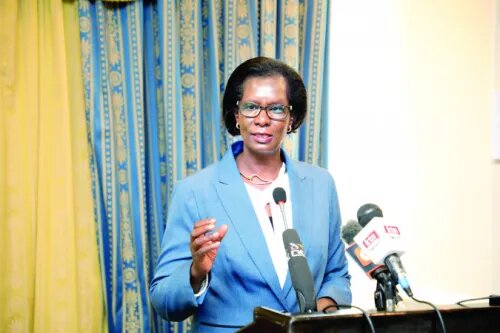SRC defends decision to stop legislators sitting allowances

The Salaries and Remuneration Commission (SRC) has defended its decision to abolish sitting allowances in plenary sessions for lawmakers, saying it is based on principles of equity and fairness.
Newly elected MPs have asked their employer, the Parliamentary Service Commission (PSC), to challenge the decision in court.
The SRC, in a Gazette Notice issued last month, scrapped sitting allowances in what it said would save taxpayers over Sh1 billion annually.
However, the SRC retained committee-sitting allowances and increased MPs’ basic pay by Sh134, 000 to Sh710, 000 in an attempt to appease the lawmakers.
In an interview with Citizen TV yesterday morning, the SRC chairperson Lyn Mengich reckoned the Constitution in Article 230 sets out the principles upon which the Commission consider in determining the pay for all State Officers and also non-State officers.
Mengich said MPs, alongside Governors and Cabinet secretaries are State Officers whose remuneration is guided by five principles that govern pay determination.
“The first one is about the affordability and fiscal sustainability of the wage bill. The second principle is about attracting and retaining requisite skills in public service,” Mengich said.
“The third one is to recognise performance and productivity in pay. The fourth one is fairness and transparency while the fifth principle which is in the SRC act speaks of equal pay for work of equal value,” she added.
In arriving at the decision on the plenary sittings, the SRC chairperson argued that as a commission, they looked at the pay of the State officers from two main perspectives principles namely equity and fairness.
“Equity means that you pay is equal pay for work of equal value. So how do we arrive at, this is that we carry out job evaluation, and we determine the relative job worth is determined,” she held.
Mengich argued that looking at the grading of the legislator’s job, and also carrying out salary market surveys and for state officer status, international benchmarks to arrive at the pay for the president will then cascade to all the other roles.
“So, the current grading for the role of a member of parliament in the current valuation was actually upgraded to a job grade which we are which we refer to as F1,” she said.
According to her, the MP job is equivalent to the grading of peers as that of the chair of a commission, which is at the same level as F1.
“The principle of equity dictates that the rules that are at the same level should add the same pay. So, we look at today the pay for F1 is at 765,000. Right? For MP, it’s actually above that.
You will see from the Gazette notice that the pay is Sh710,000 before we add the sitting allowances for committee sittings, which adds up to a maximum of about Sh 120,000,” she said.
She added: “So, if you take the Sh710, 000 and 120,000 it means actually their take home is Sh830,000 which is then above the salary established for the role at F1”
On the contested plenary sittings allowances, SRC said if you add basic pay to add plenary sittings that take their pay to Sh910, 000 or Sh992,000 per month, which then means you would be remunerating a MP equal to a cabinet secretary equal to a governor.
“So, the principle of equity, then dictated that we then remove plenary sittings to ensure that the pay is at the same level. So, the wage bill, the Public Finance Management Act, stipulates that we should not be spending more than 35 percent,’ she held.
Looking at the country’s revenue, the public sector should not be spending more than 35 percent of its revenue on basic salaries and allowances.
“We abolished the sitting allowances during plenary sessions to ensure that we release resources for service delivery and for development,” she noted.
At the moment, Mengich lamented the country’s ratios of revenue compared to the public wage bill are not good.
“It was to some extent affected because of the pandemic, So we are as we speak when we look at the wage bill, we are spending up to 56 percent of our revenue on the wage bill which is not sustainable,” he held.
She reckoned that it is very important that the country manages its ballooning wage bill to the extent that we do not unduly take away money from service delivery from development.
MPs earn about Sh5, 000 for every sitting and the abolishment of the allowances for plenary sessions in the National Assembly and Senate is meant to ease the pressure on the public sector wage bill which is currently at Sh930.5 billion annually.
“In this, we start with the members of parliament by abolishing plenary sitting allowances which annually will save the country 450 million, which translates to 2.2 billion for the five-year period,” she said.
She held that same plenary sitting allowances is also abolished at the county assemblies and that translates to 1.2 billion on an annual basis, which is 6 billion for the five-year period.
“So, in total, we are looking at 8.2 billion for both national and the county assemblies,” she held.
The scraping of the plenary sitting allowances will take effect when the newly elected MPs are sworn-in before September 9.













